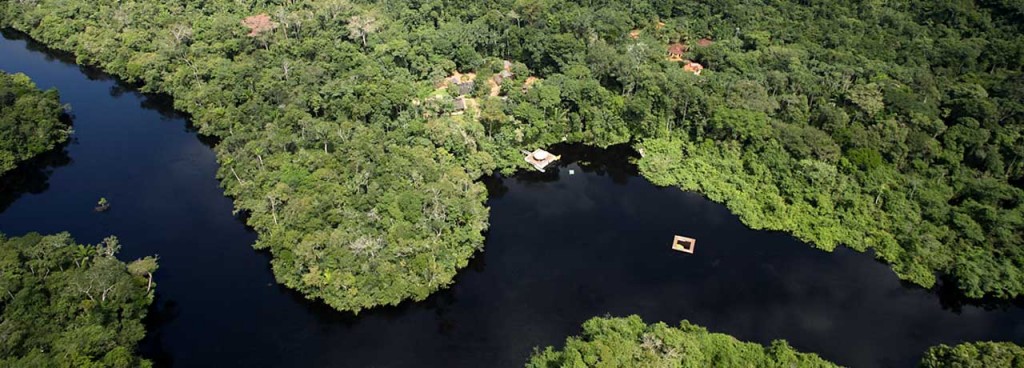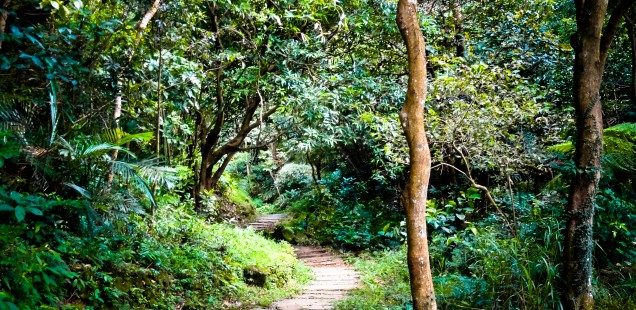Tropical Treasure: Prostpecting for Gold in the Jungles

There is one treasure guaranteed to those who would placer mine in the tropics. Gold divers are embarking, in reality or in dreams, to newly opened areas in the jungles of Brazil, Borneo, New Guinean frontiers. All will find the one guaranteed dream, the one guaranteed tropical treasure trove, ADVENTURE!
Dredging in tropical waters, moving boulders and avoiding man-killing water creatures, gets the ol’ adrenalin pumping. And, below, I’m going to tell you about one of the heart-racing experiences that happened to me.
No experience is much scarier than diving blind. Jungle rivers are often as clear as ditch water, because of mud, silt, or suspended organic materials. Under these conditions you can’t see while under water; you must feel your way along the river bottom. And that can lead you to the adventure of a lifetime.

For prospectors willing and ready to go for the adventure, now is the time. The political and economic climate for the small entrepreneur has never been better and is improving. The restrictive regimes of many countries are being overthrown and replaced by governments desperate for the influx of capital and receptive to start-up projects, including mining. In fact, current trends could lead the Soviet Union to open its doors to prospecting by foreigners.
The Siberian gold fields would be like Alaska, only potentially richer. Nyet, no, not for me. I’d rather stay warm and take my chances with tropical climes.
And take my chances I did. A number of years ago, a small, loosely-bound aggregate of placer miners from California, including myself, took our dredges on an expedition to the country of Guyana in the northeast part of South America. Our quarry was diamonds.
We were headed for the Potaro, a river in the highlands that flows the color of rich coffee. The hue is the result of a blend of tanins leached out of the fallen dead leaves from the tropical rain forest through which the river cuts its black swath.
Diving in the Potaro River is as blind as driving on a country road on a moonless night with no headlights. In the depths of the river you canÕt see your hand held six inches in front of your face. You must grope your way over and between boulders while steadying yourself in the relentless current.
The overland segment of our journey into the interior was by truck across the jungle on a narrow, sandy road that ended at Kangaruma. This tiny spot on the map, this point of embarkation for seekers of fortune or nature who dared venture on up the dark Potaro, was camp for the next ten days.
We eagerly worked together those days, rich with anticipation. Our eyes sparkled with adamantine brilliance as we built our boats and pontoons from local materials, and assembled our supplies, engines, pumps, air and water lines needed for our eight-inch diameter, underwater dredges. After distributing supplies to the four-dredge crews, we split up, each dredge unit going its separate way, casting off into the river searching for prospecting sites.

I elected to go farther upstream than the other dredge teams. I sought out more dangerous areas to dive and areas with large deposits of sand overburden. These sites were the least likely to have been overworked by surface dredges which previously plied the Potaro.
My crew consisted of an East Indian, Jeffery, our cook and camp keeper, an Afro-Guyanan, Charlie, who spoke English with a distinctly Caribbean accent, an American engineer, Norm, and me.
The day of shadows in the depths came like other days on that dark ribbon flowing through the lush tropical forest steamy and oppressive. We completed the dreary task of clearing a large table of sand overburden that morning. We had been working on it for days, and the sweet feel of the gravel underneath spelled payday.
Charlie and I were alternating diving shifts. We had finished our lunch and mid-day siesta, and Charlie was working the bottom. I felt three tugs on the waist-line safety rope. Charlie was coming up, so I took up the slack. When Charlie surfaced, he said he wanted to quit for the day.
“Hey, what? You’ve only been down for twenty minutes. What gives?” I asked. I saw a trickle of red on Charlie’s upper lip and wondered if he’d had a recurrence of the nosebleeds he sometimes acquired when diving in deep water. But we were working that day in only 15 feet; a shallow backwash where the current was slow.
He replied, “Don’ go down today, Mon. It’s no good. Dem be spirits der.”
“What is there?”
“I don’ know, Mon. It don’ feel good.”
Charlie had been given to telling ghost stories occasionally when we gathered around Jeffrey’s cook fire in the evenings, so I figured his imagination was working overtime. No superstition was going to deter me. Besides, going down below afforded a cool escape.
I took the weight belt from Charlie’s waist and strapped it on me. Picking up the air hose and placing the mouthpiece between my lips, I grabbed hold of the forward guy wire and jumped overboard. Descending into the darkness hand over hand along the wire was like spelunking without a light.
When I reached the river bottom, I felt my way to the front of the dredge pipe. Charlie, in his rush to ascend, had dropped the nozzle end of the pipe into the rim of a sand bank. The pipe slipped in my hand when I tried to pick it up, and the jagged edge we had been meaning to file down sliced my finger. Damn. I readjusted the nozzle to work the strip of gravel below a large boulder at the edge of the table we had cleared.
I stopped and stood for a moment in the dark, rubbing my cut finger. I held my breath and listened to the cavitations of the current as its force flowed over and around me. Close at hand was the sound of gravel being sucked through the pipe. I heard in the distance the gravely crunch of movement of a boulder. But, wait, there was some other sound, like a breeze, as if some strange wind were taking over dominance from the current. Then still silence again, as much as a current could ever be still or silent.
No, it was a change in sounda mother knows when her child’s cry is different. There was something out there. I yanked hard once on the safety rope, the signal for the crew to cut the power to the dredge. The noise in the dredge quieted down. Yes, something there, moving nearby. Getting closer.
An entity brushed my arm. A shadow sensed like the feathery touch of the edge of a curtain blowing lightly in an open window. I turned, but couldn’t see a thing. Suddenly I shivered, and goose flesh tingled over my body.
“Get hold of yourself,” I shouted in the chambers of my skull. How do you see a shadow in a cave with no lights? There it was again; something you don’t see just past the corner of your eye.
It swished by like a dart. I gripped the guy wire. Dizzy, better get to the surface. No, only swaying in the current. Feargo up now! I pulled on the safety rope. Three tugs, I’m coming up.
Ten feet, as quick as I could rise. Five feet. Nearing the surface. It was getting light, and I could see a leaf floating by immediately above my head. A shadow over my left shoulder slithered by. This time there was a slight humming sound, a pure base note that vibrated on the skin of my shoulder.
I burst to the surface, spitting out the air hose mouthpiece. “What was that?”
Charlie smiled his irregular grin. “Only an electric eel, Mon.”
Only!
Later, after I dried off and had a stiff swig of Demerara rum, I was able to calmly reflect on the shadowy encounters. The electric eel? I definitely felt the current, the hum from the shadow on the surface; but the eel didn’t touch me, and it undulated and moved slowly. Not like down below, where a denizen of the depths swished by me, brushing me like the shaft of a deadly arrow.
Soon the sun was beginning to set over the forest canopy. We were tired of the pork tails and rice that had been our fare for the past week, so we went fishing. Norm held a short-fused dynamite stick, and I lit it. We counted down the seconds, and he tossed it in the downstream edge of the backwater area where we had been diving that day. The concussion of the explosion killed three fish which came floating belly up to the surface.
Charlie dove in, grabbed the three piscine bodies, and hurled them onto the shore at my feet. The fish were good sized,thick bodied and varying from 12 to 21 inches in length. And such a set of teeth!
My eyes opened wide as what I saw forged in me the chilling comprehension of the danger that lurked in the depths I’d worked in that day. The fish were all piranhas.
These deadly fish were no doubt attracted by Charlie’s and my blood. And piranha, as I was told later by a naturalist friend, are known to swim together in areas of the river where the current is slow moving.
The trio still looked ferocious an hour later when they were served up for dinner. Each had its mouth stuffedlike the head of a pit-roasted wild boarwith cumquat-like fruit ringed with needle-sharp teeth. They were among the most delicious fish I’d ever eaten, and the danger in the diving hole had been removed…at least for awhile.
The piranha provided one spirit-stirring day that was unforgettable, and there were many other days to rival that one. Did I have good luck in my findings? Yes indeed, with gold nearly everywhere we searched and enough diamonds, too…but that’s a story for another day.
Looking back on it and weighing everything, all the troy ounces and carats couldn’t tip the scales away from the rich cache we all cherish, ADVENTURE!

